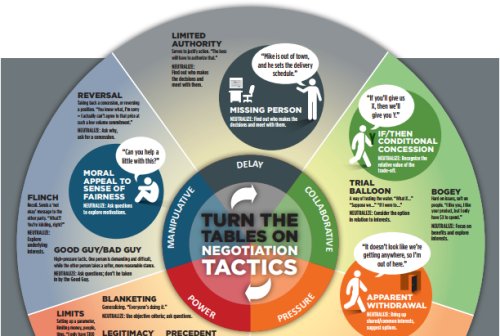Upon entering the board room or any other negotiation with due preparation (see other article before negotiation), then consider adding these techniques to your repertoire. These are all good solid people skills that will put people at ease and reflect on you positively...whether you're in a divorce settlement and it's furniture or homes up for grabs or you are a bigger business out to merge tempoarily with a smaller business, these skills will be invaluable.
Start each negotiation with a friendly handshake and decent eye contact. Be sure as always that you have dressed in a manner that the other party will not find offensive. In other words, make sure you are taking this negotiation seriously by trying to prevent hindering viewpoints in advance of entering the negotiation.
Consider telling a joke. Like most good talk show hosts, be sure to tell a story to break the ice. It reminds people that though there are dollars and cents to consider, you are also a human being. It puts you and the other person at ease and it also makes you look good. Always choose to tell a story that makes you sound human or revolves around you in some way. Telling a joke about an ethnicity or minority is completely out.
There is one amazing talk show host that comes on at midnight on the CBC called George Stephanopolous. He started his show the other day with a first hand account of how he thought a racoon had come into his house through his window and he was freaked out. It gets worse. Makes him look funny throughout and worse yet, it turns out to be a cat. He told this slice of life for a good five minutes.
Even I was sitting there after ready to listen to every word this man said. I was blown away by this reminder that despite his great job, he is human and naturally, that meant I would place value on what he said.
Try to quietly lay out the ground rules after the story. Remind the party that your negotiating in of why you are interested. Try to have a few good reasons. Point out the positives that may be accomplished but of course, let them know that though you are negotiating, it may take time to 'do the deal' and that is to be expected when so much is at stake.
Good manners now come into play. Remember good eye contact. Remember to maintain your composure, your posture throughout with good eye contact. This reflects well on you that you are willing to listen. Chances are the other person will offer less than they would actually deliver. Though you would be tempted to pepper the person with the presentation with question after question, hold onto them by taking notes. Unless there is a serious misunderstanding, do not try to ask questions until after the presentation. This could break the flow of their presentation.
While in negotiations, avoid negative body movements such as sloped shoulders. This means disinterest. Make sure not to tap or shuffle. Maintain a studious composure. Don't doodle! Whether you're a big company thinking of merging with a little company for a project, the bigger company must come off good if not better than the smaller company. You want people to be in negotiations with you, otherwise you would not have come to the meeting. Your secretary would still be saying that you'll phone them back.
Listen to the presentation and take notes. It means that you're interested and that they do have points of interest. It also helps you to stay on task.
When it is a natural break or the presentation is over, ask questions.
To maintain complete control in a negotiation, you would not offer one square thought but of course, this would not go over well with a company that spent time on a presentation. Praise the good points in the presentation and ask a few questions. Perhaps, direct questions to find out where you meet in terms of negotiations.
Put down some points on paper that you both can mutually consider and make a copy. Sketch these out with possible scenarios of how it works in conversation. Try not to get hung up in the details. These can be tied up later.
A first negotiation typically leads to a second negotiation when you do not immediately agree to everything. When things mean so much such as two businesses coming together for an event, you need to make sure that you consider such things as reputation. Will partnering with this company adversely affect you? Are the stakes too high? Do you want more guarantees? What are the expenses? If your company covers one thing, what will their company cover or are the budgets merged?
In terms of settlements, agreement on the first round is almost unheard of and the reasons for this are plentiful. So make sure that after a reasonable time, you end the proceedings and ask for a second negotiation after you both have considered all the points that bring up.
Those who rush to the altar are often disappointed so key here is having more than one negotiation and repeating many of these same successful people skills, great skills to improve your negotiation repertoire.
Robyn Whyte is the CEO of Stargazer Press, a fine publisher of novels and educational resources. Stop by at [https://www.stargazerpress.com] to have a look.
Related: Negotiation Training Workshops
Free Downloads

Neutralizing Negotiation Tactics
Public Negotiation Training